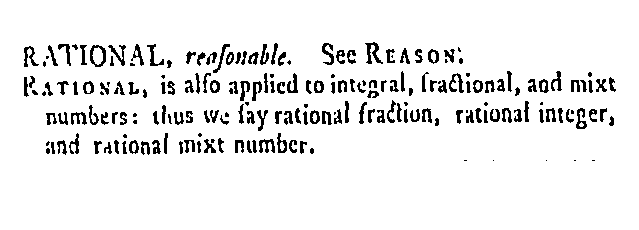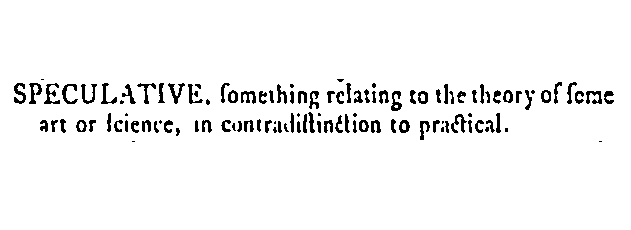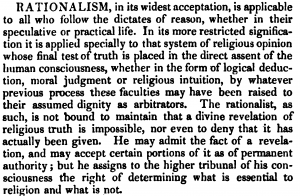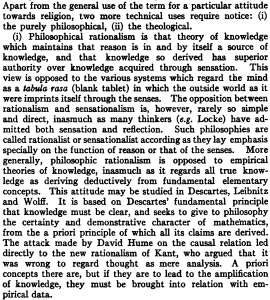On the Early Modern Meanings of “Rationalism”
Alberto Vanzo writes…
In last week’s post, Juan noted that the Encyclopedia Britannica first recorded the philosophical meaning of the term “rationalism” in the early twentieth century. As Juan states, this lends support to the view that “rationalism” started to be “used to refer to early modern philosophy” in “the first decades of the twentieth century”. I am sympathetic to this view. In this post, I will defend it from two objections.
The first objection is that Bacon himself used used the term “rationalist” in a philosophical sense, for instance when he wrote:
- Empiricists are like ants; they collect and put to use; but rationalists are like spiders; they spin threads out of themselves (Cogitata et visa; see Novum Organum, I, 95)
This objection can be dispensed with rather quickly, as Peter did on this blog some time ago. Bacon did not use the term “rationalists”. He referred to those who “spin threads out of themselves” as “rationals” (rationales) and to their philosophy as philosophia rationalis (rational philosophy, e.g. in Novum Organum, I, 42, 64), not as rationalism. One cannot find a philosophical use of the English terms “rationalist” or “rationalism” in Bacon’s texts.
The second objection notes that, nevertheless, the translation of Bacon’s “rationales” as rationalists is an early modern one. Shaw’s 1733 English translation of the Novum Organum states: “Those who have treated the Sciences, were either Empirics, or Rationalists. […] the Rationalists [are] like Spiders […]”. Although this use of “Rationalist” is not recorded in the Encyclopaedia Britannica, it is recorded in other reference texts, such as the 1740 edition of Dyche’s and Pardon’s New General English Dictionary, the 1755-1756 edition of Johnson’s English Dictionary, and this entry from the 1828 edition of Webster’s American Dictionary of the English Language:
- RATIONALIST, n. One who proceeds in his certain disquisitions and practice wholly upon reason. – Bacon.
(I owe these references to Li Ling.) Webster’s entry recalls a passage by Shaftesbury, to whom, according to the Oxford English Dictionary, we owe the first recorded use of the term “empiricist” (1705). Shaftersbury characterizes rationalists as those “who walk by Reason in every thing”. This statement may sound rather similar to one that can be found in an early twentieth-century edition of the Encyclopaedia Britannica: according to rationalists, «reason is in and by itself a source of knowledge» which «has superior authority over knowledge acquired through sensation».
How can we respond to this objection? It is true that there are early modern uses of the term “rationalist” in relation to philosophers. However, the term was used for philosophers in the broad early modern sense of all those who pursue scientia, especially for natural philosophers, and has a methodological connotation: it designates their (reflected or unreflected) reliance on reason. By contrast, the twentieth-century philosophical use of “rationalism” designates the endorsement of a specific epistemological view. In the terms of the Encyclopaedia Britannica, “philosophical rationalism” is a “theory of knowledge”.
Additionally, the existence of early modern philosophical uses of the adjective “rationalist” does not entail that the noun “rationalism” was used in a philosophical sense too. The term was mostly used in a theological sense to designate those who stressed the importance of reason not over the sense, but over faith or revelation. Whereas Webster’s dictionary records a philosophical use of “rationalist” with a reference to Bacon, it does not record any philosophical use of “rationalism”. For Webster, rationalism is “[t]he practice or tenets of certain latitudinarian divines”. Shaftesbury contrasts the attitude of the rationalists, who “exalted Reason above Faith“, with the prominence that he accords to faith above reason: “We for our parts know nothing, and believe all”.
Finally, pre-Kantian writers nearly did not associate the term “rationalism” with the textbook rationalists of twentieth-century texts, namely Descartes, Spinoza and Leibniz. Indeed, the only pre-Kantian text of which I am aware which groups together Descartes, Spinoza and Leibniz is Account of Sir Newton’s Discoveries, but it does not use the term “rationalism”. One can find the association of “rationalism” with Descartes, Spinoza and Leibniz in nineteenth-century translations of German texts, but the English term “rationalism” started to be routinely associated with Descartes, Spinoza and Leibniz only around the turn of the twentieth century. It is only in this period that, as is witnessed by the changes in the Encyclopaedia Britannica highlighted by Juan, the now-standard epistemological usage of “rationalism” to refer to early modern philosophers became established.
Tracking Terms in the Encyclopædia Britannica: Part II
Juan Gomez writes…
In my previous post I explored the use of the terms ‘experimental philosophy’ and ’empiricism’ in the Encyclopædia Britannica. Today I will look at the terms ‘speculative’ and ‘rationalism’ throughout the first nine editions of the Encyclopædia.
Speculative
There is no entry for ‘speculative philosophy’ in any of the eighteenth and nineteenth century editions. However,the term ‘speculative’ on its own appears in the first seven editions (1771-1827). It is a very short entry, it was never expanded or modified and it disappears entirely from the 1853 edition onwards.
We can see Bacon’s contrast between speculative and practical present in this definition which remained in the exact same form in all the editions it appeared. It seems to be more of a dictionary definition pertaining to the standard meaning of the word at the time. This is also the case for the term ‘rational’ that appears only in the first edition (1771) of the Encyclopædia.
Rational/Rationalism
Although there was no entry for ‘rationalism’ until the 1853(8th) edition, we do find a brief entry for ‘rational’ in the first edition:

This is the only entry for ‘rational’ in any edition of the Encyclopædia. We can see that it does not have any connotation other than its specific use in mathematics and its use as an adjective meaning ‘reasonable.’
On the other hand, ‘rationalism’ appears for the first time in the same edition where the terms ’empiric’ and ‘experimental philosophy’ disappear, and there is no entry for ’empiricism’ yet (it first appeared in the 11th edition in 1910). We can see here that even by the mid-nineteenth century the term still had a restricted meaning that pertained specifically to religion.
As it was the case with ’empiricism,’ ‘rationalism’ only appears in its modern sense in the twentieth century, where two definitions if the term are given: one referring to it’s use regarding religion present in the quote above, and the second one regarding its use in philosophy:
It is not until the first decades of the twentieth century that we see the terms ‘rationalism’ and ’empiricism’ being used to refer to early modern philosophy, showing that the ESD framework has some considerable advantages over the RED for interpreting the Early Modern period.
The origins of ‘solar system’
Peter Anstey writes…
The Cartesian vortex theory of planetary motions came under serious suspicion in England in the early 1680s. To be sure, many still spoke of ‘our vortex’ well into the 1680s and ’90s, such as Robert Boyle in his Notion of Nature of 1686 (Works, eds. Hunter and Davis, London, 1999–2000, 10, p. 508), but by the early 1690s the new Newtonian cosmology was coming to be widely accepted and many in England thought that the vortex theory had been disproved. By that time the vortex theory of planetary motions had come to be seen as the archetypal form of speculative natural philosophy. What was required then was a new descriptor for that cosmological structure in which the earth is located. And a new term was soon deployed, namely, ‘solar system’.
Some have claimed that it was John Locke who coined the term ‘solar system’. In fact, the OED lists Locke’s Elements of Natural Philosophy, which it dates at c.1704, as the earliest occurrence. However, the term first appears in his writings in Some Thoughts concerning Education of 1693 where speaking of Newton’s ‘admirable Book’ about ‘this our Planetary World’, he says,
his Book will deserve to be read, and give no small light and pleasure to those, who willing to understand the Motions, Properties, and Operations of the great Masses of Matter, in this our Solar System, will but carefully mind his Conclusions… (Clarendon edition, 1989, p. 249)
Interestingly, a quick word search of EEBO reveals that the term was also used by Richard Bentley in his seventh Boyle lecture of 7 November 1692, but published in 1693 in a volume that Locke owned (Folly & Unreasonableness of Atheism, London). Bentley uses the term in an argument for the existence of God on the basis of the claim that the fixed stars all have the power of gravity. It is God who prevents the whole system from collapsing into a common centre:
here’s an innumerable multitude of Fixt Starrs or Suns; all of which are demonstrated (and supposed also by our Adversaries) to have Mutual Attraction: or if they have not; even Not to have it is an equal Proof of a Divine Being, that hath so arbitrarily indued Matter with a Power of Gravity not essential to it, and hath confined its action to the Matter of its own Solar System: I say, all the Fixt Starrs have a principle of mutual Gravitation; and yet they are neither revolved about a common Center, nor have any Transverse Impulse nor any thing else to restrain them from approaching toward each other, as their Gravitating Powers incite them. Now what Natural Cause can overcome Nature it self? What is it that holds and keeps them in fixed Stations and Intervals against an incessant and inherent Tendency to desert them? (p. 37, underlining added)
There is no evidence, however, that Bentley was using the term as an alternative to ‘our vortex’. In a letter to Newton of 18 February 1693 he speaks unabashedly of matter that ‘is found in our Suns Vortex’.
Who published the word first? Bentley’s seventh Boyle lecture was not published separately, but appeared in the 1693 volume, the last lecture of which was not given its imprimatur until 30 May that year. Locke’s book was advertised in the London Gazette #2886 for 6–10 July. I have not been able to establish exactly when Bentley’s volume appeared, but it’s not mentioned in the London Gazette before #2886.
Whatever the case, it is most likely that the term was already ‘in the air’ and history shows that it was soon widely used and, of course, it is a commonplace today.
(N.B. This post also appears on the Early Modern at Otago blog.)
Oldenburg and Newton on ‘Experimental Philosophy’
Kirsten Walsh writes…
During the debate following the publication of Newton’s first paper, Newton provided a set of eight queries, in an attempt to steer the debate towards a satisfactory conclusion. When Henry Oldenburg, Secretary of the Royal Society and Editor of the Philosophical Transactions, published Newton’s queries, he added the following introduction:
- A Serie’s of Quere’s propounded by Mr. Isaac Newton, to be determin’d by Experiments, positively and directly concluding his new Theory of Light and Colours; and here recommended to the Industry of the Lovers of Experimental Philosophy, as they were generously imparted to the Publisher in a Letter of the said Mr. Newtons of July 8. 1672.
However, Newton didn’t describe his own work as ‘experimental philosophy’ until 1713, when he added the General Scholium to the Principia. He wrote:
- … and hypotheses, whether metaphysical or physical, or based on occult qualities, or mechanical, have no place in experimental philosophy. In this experimental philosophy, propositions are deduced from the phenomena and are made general by induction.
In 1672, would Newton have been comfortable with Oldenburg’s label ‘experimental philosopher’? Or did he consciously avoid the label, as Alan Shapiro suggests, in order to distance himself from the methodology of the early Royal Society?
Oldenburg on ‘Experimental Philosophy’

Henry Oldenburg (1619-1677)
To begin, what did Oldenburg mean by ‘experimental philosophy’? Let’s look at his prefaces to each issue of the Philosophical Transactions.
Firstly, Oldenburg was talking about the Baconian experimental philosophy. In the 1672 Preface, Oldenburg chose to adopt Bacon’s term, ‘Operative Philosophy’, which he used interchangeably with the term ‘Experimental Philosophy’. And he wrote:
- But, when our renowned Lord Bacon had demonstrated the Methods for a perfect Restauration of all parts of Real knowledge … The success became on a sudden stupendious, and Effective philosophy began to sparkle, and even to flow into beams of bright-shining Light, all over the World.
Moreover, in 1671, Oldenburg advocated Abraham Cowley’s Baconian-vision for the Royal Society. In his book, Proposition for the Advancement of Experimental Philosophy, Cowley proposed that the Royal Society appoint professors who were:
- bound to study and teach all sorts of Natural, Experimental Philosophy, to consist of the Mathematicks, Mechanicks, Medicine, Anatomy, Chymistry, the History of Animals, Plants …. and briefly all things contained in the Catalogue of Natural Histories annexed to My Lord Bacon’s Organon.
(Incidentally, in a previous post on this blog, Peter Anstey has identified this as the first English book to use the term ‘experimental philosophy’ in its title.)
Secondly, Oldenburg had in mind an experimental philosophy that emphasised the construction of natural histories. For example, in 1669, Oldenburg wrote:
- …we then made an Attempt of laying some Foundation for the Improvement of real Philosophy, and for the spreading of Useful knowledge; in publishing Advices and Directions for the writing of an Experimental Natural History…
Thirdly, Oldenburg had in mind an experimental philosophy that attempted to recover ancient knowledge. For example, in 1671, responding to critics of the experimental philosophy, Oldenburg wrote:
- they call it contemptuously the New Philosophy; when as yet perhaps themselves are not ignorant, that ‘tis so old as to have been the Discipline in Paradise; and from the First of Mankind … to have been practised and countenanced by the Best of Men…
Moreover:
- … we may not lay aside the other expedient, which is so helpful to explicate the Old Wonders of Art, and Old Histories of Nature; namely, To inquire diligently The things that are; What Rarities of Nature, and what Inventions of Men are now extant in any parts of the World.
To summarise, Oldenburg had in mind an experimental philosophy that:
- Followed Bacon’s method;
- Constructed natural histories; and
- Investigated ancient knowledge.
Newton on ‘Experimental Philosophy’

Isaac Newton (1642-1727)
Would Newton have approved of this way of describing his work?
Certainly Newton would have approved of being broadly aligned with the experimentalist philosophers, as opposed to the speculative philosophers. In his ‘Queries Paper’, he wrote:
- … the Theory … was evinced to me … not by deducing it only from a confutation of contrary suppositions, but by deriving it from Experiments concluding positively and directly.
And in the first paper, he wrote: “And I shall not mingle conjectures with certainties”.
While Newton didn’t construct natural histories, he may have approved of the Baconian overtones of the label. For, as I’ve discussed previously, Newton’s 1672 queries resemble Baconian queries.
Newton may even have approved of the suggestion that his method had ties to the Ancients. For example, as early as 1686, in his Preface to Principia, Newton emphasised the influence of the Ancients:
- Since the Ancients (according to Pappus) considered mechanics to be of the greatest importance in the investigation of nature and science and since the moderns – rejecting substantial forms and occult qualities – have undertaken to reduce the phenomena of nature of mathematical laws, it has seemed best in this treatise to concentrate on mathematics as it relates to natural philosophy.
So, I think Newton would have approved of Oldenburg’s label, even though later on, when he came to describe his own experimental philosophy, the emphasis was quite different. For example, in Query 31 of the Opticks, Newton wrote:
- This Analysis consists in making Experiments and Observations, and in drawing general Conclusions from them by Induction, and admitting of no Objections against the Conclusions, but such as are taken from Experiments, or other certain Truths. For Hypotheses are not to be regarded in experimental Philosophy.




